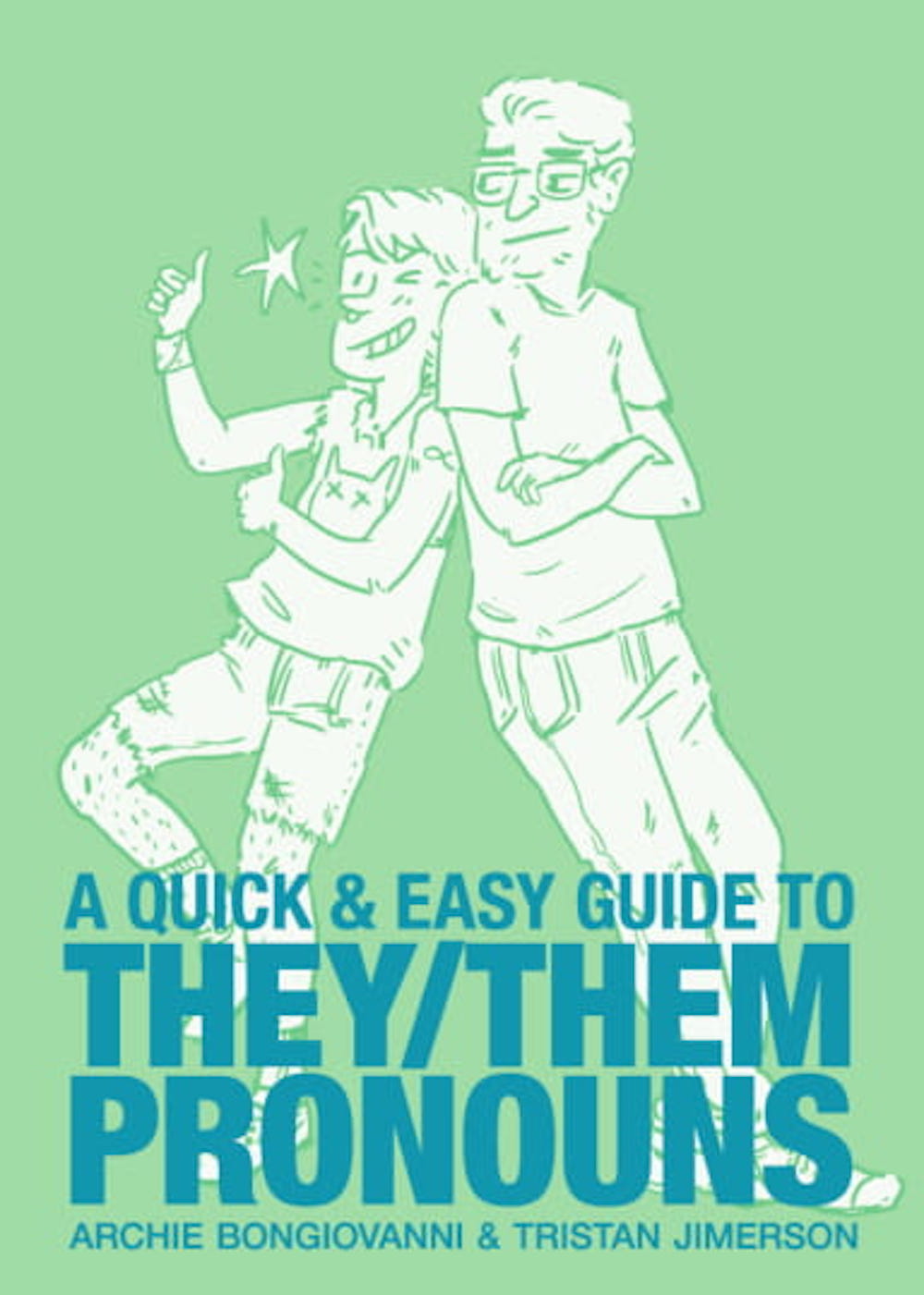Tackling the language debate around gender head-on, genderqueer Archie Bongiovanni and cisgender Tristan Jimerson break down a complex subject into one handy, pocket-sized guide
I love language debates. There’s nothing more fascinating than seeing how our hodge-podge of a language has evolved and grown over the years, adapting to the growing demands of society. If you ever want to waste a good chunk of your morning, come and start talking to me about the Oxford comma – I can go on about it for hours.
Every now and then though, a topic comes up where I’m just not quite sure if I’m the right person to talk about it. As a cisgender person (someone whose sense of personal identity and gender identity both correspond with their birth gender), taking a critical look at a book talking about gender-neutral pronouns sat a little uncomfortably with me at first.

A Quick and Easy Guide to They/Them Pronouns
Co-author Tristan had similar worries when approached by longtime friend and non-binary individual, Archie. They explain that they want to address the topic for everyone – both those that have lived it, and those who are new to the concept. This combination of perspectives provides a greater insight for readers from different backgrounds, highlighting another side that they may not have previously considered.
Delivering exactly what it says on the tin, A Quick and Easy Guide to They/Them Pronouns is an introduction to gender-neutral pronouns for the uninitiated. If you’ve never felt quite sure how to explain gender neutral language and its importance, this is the book for you.
If, on the other hand, you are wondering why someone would choose to use gender neutral pronouns, Archie has a great explanation ready: “There are a huge list of reasons, but the truth is… it doesn’t matter! You aren’t owed an explanation. It’s your responsibility as a decent human being to learn and use whatever pronouns they ask you to.”
Being misgendered, they explain, can be mentally exhausting. It can make people feel alone, invisible, afraid, exhausted, frustrated, or angry. “Even if you don’t get it, you should learn how to use pronouns people request because you love them, like them, or want to work with them. Telling someone their pronouns don’t matter is basically telling them they don’t matter.”
Unapologetic in its subject matter, the authors explain how we can use more sensitive, inclusive language in our day-to-day lives. Focusing primarily on they/them, the authors briefly touch on other pronouns such as ze/hir. Along with including some handy cheat sheets to help readers get started, there is also a short list of places readers can find further information beyond this gentle introduction.
One important area the authors highlight is society’s tendency to assume someone’s gender based on hairstyle, clothing choices, or even their name. Archie uses a great example to help explain it to those who might struggle. “You [Tristan] look like a Bob, so I’m going to ignore your personal experience to fit into my own worldview… This is how I feel every time I’m purposely misgendered,” Archie says.

The non-binary pride flag
The first in a new series from Limerence Press looking at gender and sexuality, A Quick & Easy Guide to They/Them Pronouns covers not just how to use more inclusive language, but why it’s so important. Whether we realise it or not, our choice in language can provide help, comfort, and validation for non-binary individuals in a widely binary world.
Aimed primarily at readers who are new to the concept, Archie and Tristan’s easy, humorous dialogue and quirky, distinct illustrations help create a book that encourages readers to implement the basics, practice using language that avoids alienating others, and highlights simple ways we can avoid misgendering people – and what you can do if you make a mistake!
A good introduction for newbies (and a great book to share with friends, family and colleagues), the book also touches on ways non-binary people can come out to friends, ways in which they have handled loved ones who refuse to use their preferred pronouns, and the importance of having a support network ready for when times may feel tough.
In essence, this is a book all about the importance of communication. This isn’t just an issue for some people; it’s something we all need to get onboard with. Ungendered language is just one of many positive moves towards change. Will it take some work to change the way we talk? Yes. Are we going to slip from time-to-time? Undoubtedly. As long as we’re striving to do better, as long as we keep making the effort – and encouraging others to as well – that’s what really matters.
A Quick & Easy Guide To They/Them Pronouns
Written by Archie Bongiovanni and Tristan Jimerson. RRP £6.99.


Comments